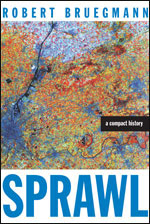Review: Robert Bruegmann, Sprawl
 The Weekly Standard recently praised Robert Bruegmann’s Sprawl: A Compact History. From the review by Vincent J. Cannato: "[T]his book is a refreshing antidote to the avalanche of pessimism emanating from the so-called sprawl debate. As Bruegmann writes in his introduction, it seemed as if "so many ‘right-minded’ people were so vociferous on the subject [of the perils of sprawl] that I began to suspect that there must be something suspicious about the argument itself." He approaches the topic with some much-needed skepticism toward these ‘right-minded’ critics and adds a healthy dose of nondogmatic libertarianism to the mix. The result is an eminently readable and rational book."
The Weekly Standard recently praised Robert Bruegmann’s Sprawl: A Compact History. From the review by Vincent J. Cannato: "[T]his book is a refreshing antidote to the avalanche of pessimism emanating from the so-called sprawl debate. As Bruegmann writes in his introduction, it seemed as if "so many ‘right-minded’ people were so vociferous on the subject [of the perils of sprawl] that I began to suspect that there must be something suspicious about the argument itself." He approaches the topic with some much-needed skepticism toward these ‘right-minded’ critics and adds a healthy dose of nondogmatic libertarianism to the mix. The result is an eminently readable and rational book."
In his incisive history of the expanded city, Bruegmann overturns every assumption we have about sprawl. Taking a long view of urban development, he demonstrates that sprawl is neither recent nor particularly American but as old as cities themselves, just as characteristic of ancient Rome and eighteenth-century Paris as it is of Atlanta or Los Angeles. Nor is sprawl the disaster claimed by many contemporary observers. Although sprawl, like any settlement pattern, has undoubtedly produced problems that must be addressed, it has also provided millions of people with the kinds of mobility, privacy, and choice that were once the exclusive prerogatives of the rich and powerful. The first major book to strip urban sprawl of its pejorative connotations, Sprawl offers a completely new vision of the city and its growth.
Read an excerpt.